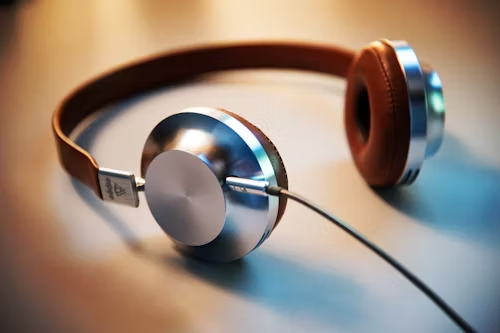The human brain processes countless sounds every day. From the beeping of supermarket tills to the whirring of a coffee machine, these sounds create a constant background noise. For some people, these everyday noises become overwhelming, making it difficult to focus on conversations or important alerts.
Sophie, a 25-year-old administrative assistant from London, understands this challenge. She often hears people telling her she zones out or doesn’t listen.
“I can hear sounds, but I struggle to tell where they come from. I recognize voices, but I can’t process them quickly,” she explained.
Although her hearing test results were normal, Sophie sought help from a private audiologist. Further testing confirmed she has auditory processing disorder (APD), a neurological condition that makes it difficult to interpret speech and sounds. Now, experts in England are questioning whether excessive use of noise-cancelling headphones could be a contributing factor.
Trouble Processing Sounds in Noisy Environments
Growing up on a quiet countryside farm, Sophie never noticed any hearing difficulties. It was only when she moved to London for university that she realized she struggled to determine where sounds originated.
During lectures, she found it difficult to understand speech. Instead of attending in person, she preferred watching lectures online with subtitles.
“In class, everything sounded like gibberish, even though I was trying to listen,” she said.
Her social life was also affected. She often left bars and restaurants early due to overwhelming noise. The cause of her APD remains unknown, but her audiologist believes her frequent use of noise-cancelling headphones—up to five hours daily—may be a factor.
Many audiologists say more research is needed. Five NHS audiology departments report an increase in young patients with hearing concerns. Although their hearing tests show normal results, they struggle to process sounds properly.
APD is more common in neurodiverse individuals, people with brain injuries, or those who had middle-ear infections as children. However, more cases are now appearing outside these groups. This raises questions about external influences like noise-cancelling headphones.
How the Brain Adapts to Everyday Sounds
Renee Almeida, an audiology clinical lead at Imperial College Healthcare NHS Trust, emphasizes the importance of exposure to different sounds. This process helps the brain decide what to focus on.
Her team has seen an increase in young people seeking hearing services.
“Hearing and listening are different. We see that listening skills are declining,” she explained.
Noise-cancelling headphones provide benefits, especially in protecting ears from loud sounds. However, their transparency levels vary. Lisa Barber, a technology editor at Which?, noted, “Some models passively reduce noise by sealing off the ears, while others allow in some background sound.”
Could Noise-Cancelling Headphones Be Causing More Harm Than Good?
Claire Benton, vice president of the British Academy of Audiology, warns that blocking everyday sounds—like car horns—may cause the brain to forget how to filter noise.
“Noise-cancelling headphones create an artificial listening environment. If young people spend years in this bubble, their ability to process real-world sounds may be delayed,” she explained.
In England, treatment for APD through the NHS is limited. A 2024 UK-wide survey found that only 4% of audiologists felt well-informed about APD. For those aged 16 and over, the Royal National ENT and Eastman Hospital is the only NHS provider offering full APD assessments, with a nine-month waiting list.
Professor Doris-Eva Bamiou, who leads assessments there, says APD testing is time-consuming.
“It’s expensive because it’s not just an audiogram—it takes up to two hours and requires cognitive and educational assessments,” she said.
The COVID-19 pandemic may have influenced listening habits. More people now use subtitles while watching videos, even when they can hear the audio. A YouGov survey found that 61% of 18- to 24-year-olds prefer watching TV with subtitles.
Dr. Angela Alexander, an audiologist and owner of APD Support, is calling for more research into noise-cancelling headphones’ impact, especially on children.
“What happens if we don’t investigate this link? Many parents and teachers think noise-cancelling headphones solve the problem, but they may contribute to it,” she warned.
Dr. Amjad Mahmood, head of audiology at Great Ormond Street Hospital, also supports further research. The hospital has seen a sharp rise in demand for APD assessments, particularly in school-aged children.
Finding Solutions for APD
APD treatment can lead to significant improvement, and some patients recover fully. One effective approach is “word in noise” training, which helps users practice distinguishing speech in noisy environments. Other training methods focus on recognizing differences between similar-sounding words, such as “seventy” and “seventeen.”
Some patients benefit from microphones and low-gain hearing aids in settings like classrooms or meetings. However, these devices are not available through the NHS for adults outside education.
Dr. Alexander explained how the brain normally processes sound: “Right now, I hear a fan above me, but my brain tells me it’s not important. This process helps identify threats in our environment. If the brain loses these inputs, anxiety may increase.”
To reduce health risks, she suggests limiting headphone use, enabling transparency modes, and choosing models that don’t completely block outside sounds.
More Research Is Needed
Wayne Wilson, an associate professor at The University of Queensland, believes more studies are necessary to determine the link between noise-cancelling headphones and APD. However, studying the impact is complex.
“The answer depends on many factors—what sounds, what noise levels, what age, and how long the noise cancellation lasts,” he said.
Sophie is set to begin APD treatment soon and feels optimistic.
“When I go to bars with my boyfriend, we sometimes leave early because of the noise. It’s reassuring to know that after treatment, I might be able to enjoy busier places more comfortably.”
For more updates on this and other health-related topics, visit Euro News 24.
